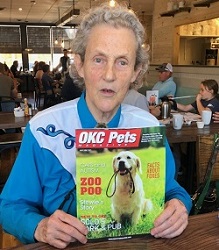Combining the equine industry with data science
BY KRISTI EATON
SUMMER STOFFEL has been involved in the equine industry since she was a little girl.
“I was introduced to horses as a child by my father, and I had a bad riding accident. He said if I wanted to continue riding, I had to take lessons,” she said. “I ended up starting at a hunter jumper barn in Tulsa. And through that, I grew up in the hunter jumper industry.”
At age 19, she had a terrible accident, breaking her neck in four places. “They told me I shouldn’t ride anymore. … and I started breeding. I wanted to provide the horses that I always wanted access to from Europe for the Oklahoma community and the Midwest and riders of the U.S.”
Over time, Stoffel developed relationships with European breed associations and learned that the horses being produced were getting lost through the cracks.
“The systems in place were allowing horses to be reregistered, sold reregistered under new names and new identities, and, so, what was the point?” she said.
It was leaving an opening for fraud and issues of biosecurity, she added.
With a degree in IT, she married the two indus- tries together and created Equicore.
“What we did is, we looked at solutions, tech- nologies being utilized in other industries and sectors, and we crossed that chasm and brought it to the equine industry,” she said.
Stoffel explained there are four different areas to the equine sector: government regulation like USDA, breed, sports federations and private industry.
“We said, [if] you’re working in one of those four, you’re producing data. A lot of times, these companies or organizations know they are pro- ducing data and know it’s valuable. They know it’s producing something to them. They know it means something to the bigger picture, but they don’t know how to extract the value from it, either monetarily … how to sell it … and they don’t know how to get the insight they need to keep growing as a business or organization,”
That’s why she decided to start Equicore, which combines horse welfare with tracking horses from multiple data sources. She can take all the data points—such as location, owner, microchip number—and cross compare them and use algorithms to come up with matches, finding horses that people would otherwise not know is the same horse that has just been renamed.
On the other side of the business, Equicore helps businesses and companies grow and secure a place in the industry by developing tools and understanding data.
Utilizing data is fairly new in the equine industry, she said.
“Most of the systems in this industry are being
of paper. Or if it’s an IT system, it’s on a very, very old platform, or they are using basic tools like Excel or Word.”
Another factor is technology can seem over- whelming to the people in the industry. “They are used to the hands-on labor side of it, so they are just afraid of it,” she said.
They also worry about the government, Big Brother-feel.
At one conference, she noted, they were talking about microchipping and the concerns. “People are worried about Big Brother and black helicopters and stuff and knowing how many horses they have for tax reasons. I raised my hand and said, ‘Does this person have a Face- book account?’”
Stoffel said that they put pictures of their horses on Facebook all the time, but people won’t know how many horses they have microchipped unless it’s connected to a number in a database.
“And at that, they wouldn’t even know what database to look into,” she added.
It can also be very hard to understand for some in the industry, so that’s why Equicore also focuses on educating the public about the methods of the industry.
CUSTOMERS
Customers are mostly companies, breed organi- zations and sports federations. “We do a lot of consulting and IT development for big brands like that,” she said.
They are the official IT consultant for the United States Hunter Jumper Association and have done consulting for other various organizations.
“We can do all the way down to individual barn stables,” she said.
Equicore has an international team. Stoffel is based in Oklahoma, while a partner, Richard Skinner, lives in Ireland. “He comes from the healthcare side, so he did in the healthcare industry what we are doing in the equine space, aggregating data about people from multiple sources and unifying them under a single record,” she said.
captured in antique methods. There’s still a lot
she said.
With his experience, specifically health law and HIPPA, she felt he would be helpful. He oversees a team of programmers in India.
Sterling Snead, Stoffel’s brother, brings the structure to the team and understands business development, while Stoffel has the domain knowledge of the industry.
“Together, we are kind of the first company to bring all the facets together of what a unicorn is,” she said, referring to the IT term. “We’re the first company to bring that to the equine industry.”
FUTURE
They have partnered with a company out of Silicon Valley to bring a data marketplace to the equine industry that will help break down the barriers. “That’s one of the biggest challenges,” she said. “Everyone understands that their data has value, but they don’t know how to price it, how to package it, and they don’t know how to market it. So, they don’t share it with each other, and they hold it to their vest.”
The company in Silicon Valley has been successful working in the trans- portation industry, and it should be ready to launch within the next month. “It will basically cross-pollinate the four different categories and will also help connect academia to make all of the data easy for research papers, product development, pharma and medical research. And the more data points you connect, the better the insight, and the more accurate and clearer the picture is. So, you can help businesses. You can help the horses. You can help understand the industry better and know what your place is in it,”
she said.
The equine industry, she noted, is stuck in the prescriptive phase and is very reactionary to what goes on, meaning they are having a hard time getting ahead of the curve and being proactive in business dealings.
“So, that’s what we are focusing on,” she said. However, she can foresee a change.
“We’ve traveled around the world, talking to breed organizations and sports federations in Europe and North America, in the Middle East, every- where. There really is starting to be an open mindset now,” she said, adding that she believes in the next five years there will be a transformative land- scape within the industry.
Equicore is always looking for collaboration and partners from unex- pected places. “We’re always seeking new partners, and we’re always open to questions and new ideas,” she added.
The company offers a free 30-minute consultation upfront to see if they can help with a potential customer’s needs. “We don’t feel like there’s a client who is too small or too big,” Stoffel said.
You can reach out to Summer Stoffel, chief executive officer of Equicore, at summer@equicore.com.

